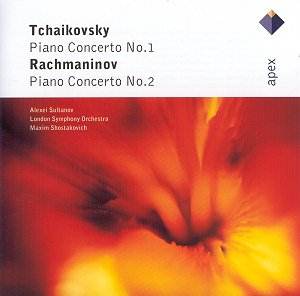Both composers had a pretty rough start to their careers and
these two piano concertos had their respective roles to play. Tchaikovsky’s
concerto, when he played it through at the Moscow Conservatoire (where,
ironically, he was a professor of composition) to the Director, Nikolai
Rubinstein, who was reputedly a fine pianist himself. He dismissed the
concerto as ‘worthless and completely unplayable, any corrections would
be pointless’. Hans von Bülow, on the other hand, received it gratefully
(unchanged) as ‘spellbinding in every respect’ and was happy to be its
dedicatee. The German master pianist performed it for the first time on
25 October 1875, and in due course a rather abashed Rubinstein took it
up (poor Tchaikovsky seemed to make a point of such misalliances, another
was Auer’s rejection of his violin concerto, then taken up triumphantly
by Adolph Brodsky in 1876, and then shamefacedly by Auer).
Rachmaninov had a bad start when Glazunov made a drunken
mess of conducting the young man’s first symphony in 1897, which cost
him a three-year period of depression and artistic inertia. It was a
crude form of psychiatry and hypnosis which restored his self-confidence
and provided the impetus to produce his second piano concerto at the
beginning of the century. Its first performance took place on 27 October
1901 with the composer as soloist. Juxtaposing both concertos here underscores
their similar starts (if dissimilar moods), introductions with block
chords on the piano which do not recur in the concerto. Unlike the Prelude
in C sharp minor, which he was always pressed to include in his recitals
if only as an encore, he loved playing this work throughout his life.
One thinks of the appearance in 1938, just five years before his death,
at London’s Royal Albert Hall to honour Sir Henry Wood (a good friend)
in his Jubilee Year.
Two war-horses they may be but this pair of piano concertos
never fail to please, unless badly played, which happily on this disc
they are not, neither are they poorly accompanied. Alexei Sultanov has
a wonderfully impressive technique, injecting both sensitivity and tenderness
where called for, full-blooded tone into the handfuls of chords at dramatic
or impassioned moments, and gifted with an amazing facility in bringing
out every semiquaver in the many cascades of runs. This is an excellently
balanced disc, if a little lacking in depth of resonance and bloom in
Snape, but one in which Maxim Shostakovich draws warmth and colour from
the LSO’s sound in all departments. He manages to bring out details
not often heard in the woodwinds in the Tchaikovsky concerto, reminding
us constantly of this supreme composer of ballet scores. Indeed there
are moments in the Andantino of the Tchaikovsky and in the Adagio of
the Rachmaninov in which he manages to transform the orchestra’s sound
to that of a Russian one (in particular the various solos); no mean
achievement. The strength of these performances is their freshness and
immediacy. One gets the impression that this collaboration was all happy
music-making.
Christopher Fifield

